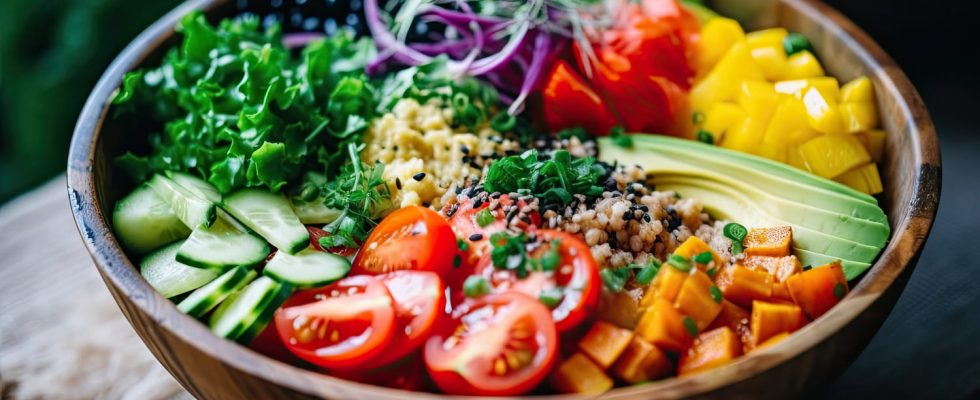The Veganuary challenge suggests adopting a vegan diet throughout the month of January. So no meat, no milk, no cheese, no fish, no eggs… Advice from a professional to achieve this.
We know the challenge of the month without alcohol (Dry January)but less the month without meat (Veganuary). However, since 2014, Veganuary has been an initiative that encourages each of us to eat vegan throughout the month of January then if they want, for the rest of the year. As a reminder, a vegan diet excludes all products of animal origin such as meat, fish, eggs, milk, cheese, honey… Does eating vegan for a month have health benefits? On the contrary, risks ? What contraindications ? What precautions should be taken? Advice from Coline Flandrin, liberal dietitian in Lille.
What is Veganuary?
Veganuary is an initiative born in England in 2014. It is a non-profit organization that encourages people to try a 100% plant-based diet throughout the month of January, or even beyond, we can read on the official site. The vegan do not eat meat, fish and all products derived from animals (eggs, milk, cheese, honey, etc.). During the 2022 edition, more than 620,000 people participated to this challenge and more than 1,540 new vegan menus and products have been launched in the different participating countries.
What does the word Veganuary mean?
Veganuary is here contraction of “veganism” and “january” (January in English).
When is the 2024 edition of Veganuary?
Veganuary is taking place the whole month of January, from January 1 to 31, 2024.
What are the health benefits of eating vegan for a month?
“Difficult to say if there are health benefits from the first month. But overall, eating plant-based has a positive impact on health provided that you respect the nutrient intake necessary for the body. For example, limit your consumption of saturated fats (butter, meat fat, etc.) preserves cardiovascular health, eat more fibers (fruits, vegetables, cereals, legumes, etc.) promotes transit and digestion and also contributes to the prevention of digestive cancers“, lists our expert.
What precautions should you take if you want to do Veganuary?
► Iron intake must be sufficient. THE heme iron (best absorbed by the body) is contained in animal proteins. Vegans only have access to non-heme iron found in plants, less absorbable. There is some in spirulina, lentils, white beans, chickpeas, chia seeds, sesame seeds, dark chocolate, split peas, whole grains… “THE iron from plants is much better absorbed if it is associated with foods rich in vitamin C such as kiwis, red fruits, citrus fruits, peppers, spinach… The idea is for example to combine legumes with vegetables rich in vitamin C or finish your meal with an orange“recommends Coline Flandrin.
► Be careful with tea consumption whose Tannins can impair the assimilation of plant-based iron. It is better to drink tea (ideally green or sencha, because these teas are antioxidants and rich in vitamin C) away from meals.
► Protein intake must be monitored. Plant sources of protein are: oilseeds (almonds, walnuts, hazelnuts, cashews, etc.), peanut butter, lentils and other legumes, quinoa, lupine seeds, pumpkin seeds, etc. to combine with a cereal to promote protein bioavailability (semolina/chickpeas, rice/red beans, pasta/red lentils…)
► Pay attention to thecalcium intake, usually found in milk, cheeses and yogurts. In the case of a vegan diet, good sources of calcium are legumes such as kidney beans, chickpeas, soybeans, white beans, lentils, some leafy greens, peas and tofu. “Some tofus or vegetable drinks are enriched with calcium. You can also opt for water rich in calcium (Hepar (549 mg/L), Courmayeur (576 mg/L), Contrex (468 mg/L)). Remember to look carefully at the labels“, specifies the expert.
What risks and contraindications to Veganuary?
“This type of challenge would rather not be recommended for people who present eating disorders, whether anorexia or bulimia, as this can lead to restrictions. THE people who have iron deficiencies or anemiasor more generally who suffer froma chronic pathologyshould also seek the advice of their doctor before adopting a 100% plant-based diet. For a person who has an illness, a vegan diet for a month can already make damage“, our interlocutor would like to conclude. “Also be careful of people who do not digest gluten very well.because in veganism, we tend to consume more bread or pasta and therefore more gluten“.
Thanks to Coline Flandrin, liberal dietician in Lille.
